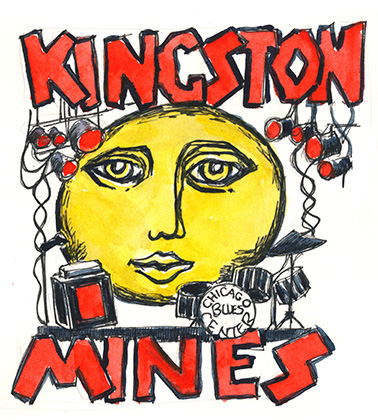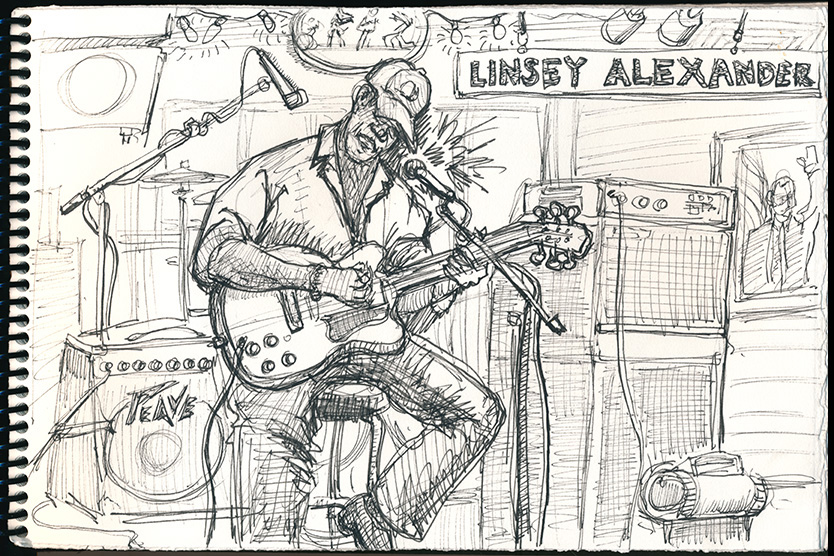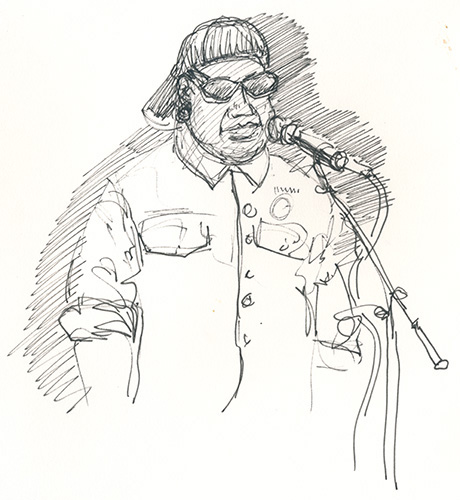Although there are many clubs in Northern California that play Blues, I didn’t want to miss out on a real Blues experience while visiting Chicago. So on Sunday evening Marilyn and I headed over to Kingston Mines in Lincoln Park, one of Chicago’s oldest and grittiest Blues clubs.
From what I’ve read, the club sprang to life in 1968 out of an old machine shop and originally staged plays and served coffee. The musical Grease first took the stage here in 1971 under the name Greased Lightning before it moved to Broadway. But eventually Delta Blues dominated the club’s lineup and by the late 1970’s, the music evolved into the Chicago Blues style. Though the club books mostly local musicians, the talent has attracted visitors such as Bob Dylan, Robert Plant, and Stevie Ray Vaughan. Mick Jagger, after having come to hear the great Lefty Dizz in 1978, ended up on stage jamming with the band. Even the Blues Brothers performed here while promoting their movie.
We arrived at the nearly-empty club just after opening at 6:15pm and sat close to the stage, at the end of a long wooden table. Neon signs glowed above the bar behind us promoting domestic beers from Pabst Blue Ribbon to Samual Adams, hinting at a diverse clientele. The elevated stage was decorated like a house’s back porch, complete with windows and wood siding. A mural just to the right of the stage further emphasized the illusion of a night out of doors.
Just as we ordered a couple of drinks, Linsey Alexander, tonight’s performer and host for Open Mic, took the stage along with a drummer and bass player. Over the years, Linsey’s played with the likes of B. B. King, Bobby Rush, and Buddy Guy, along with many other Blues greats. When not on the road, he performs regularly at Kingston Mines. Linsey’s casual rapport with the audience, which had built to a couple of dozen of us, quickly became apparent. With a sly smile, he urged musicians to add their names to the evening’s Open Mic roster. “Who wants to come up here?” he asked, adding, “I sure don’t want to be up here tonight.”
After Linsey noodled around on his guitar a bit, he called out to a man leaning on the railing left of the stage and told him, “Hey you there, get a job.” The man shot back, I’ve already got one.” With a laugh, Linsey began playing again, this time with the full band. As the dark room filled with the strains of Pure Blues, I pulled out my sketchpad and drew by the light reflecting off the stage.
After the end of the second song, a man came by our table selling Linsey’s CDs. Spotting me, he called out, “Hey Linsey, this guy’s drawing you . . . and it doesn’t look anything like you either!” Linsey shook his head and said”That figures.” I kept quiet, but smiled and took it in stride. As I’d already begun to understand, the put-downs were part of the fun. If anything, I felt included in the good humored joshing.
More patrons entered the Club, many carrying instruments ranging from guitars to harmonicas, even a washboard. Linsey called out names from the sign-up sheet and a group of six musicians made their way from audience to stage. After set up, a song was selected and the group began to jam. I was blown away by how good they sounded.
As the evening wore on, heat began to rise and the energy of the music changed from casual and effortless, to heavy jamming and pounding rhythms. The Blues are alive and well in Chicago.


